- Home
- J. P. Donleavy
Wrong Information Is Being Given Out at Princeton Page 7
Wrong Information Is Being Given Out at Princeton Read online
Page 7
“Is that right. Because he was going to rob and kill me with a knife, I should go to jail.”
“Yes. That’s what’s wrong with this country. Big bullies like you beating on the oppressed.”
And on this night after midnight of the lavish dinner in the Italian restaurant, I now walked alone down Seventh Avenue to Broadway and Forty-second Street. A girl cousin who took care of me when I was small and taught me to watch out for shooting stars said Forty-second Street and Broadway was the center of the world. Where people would come from Nebraska and Arkansas and even from farther miles away, to just stand, marvel and stare. The latest global news broadcast up in lights, the words passing like a train in front of your eyes. And as I arrived there into its glow of neon illumination, steaks being barbecued in windows, flapjacks being tossed in pans, one needed only to look down to see the sidewalks covered in crushed cigarette butts and blobs of chewing gum. It maybe could be the nearest place to hell. A traffic of strangers. And others. Pickpockets waiting for pockets to pick. Lurking pimps and prostitutes in the doorways. Loitering little groups of shady characters, crooks and drug dealers. For the prurient, movies to see. And for sale, the array of lewd, salacious and vulgar periodicals, pictures and books. In big numerals, the time and temperature. Smoke rings blown out of a mouth on a billboard. And as I went down the steps into the Eighth Avenue subway I felt that the peaceful soft white flakes of snow starting to fall were an anointment of cleansing refinement. At least before the flakes reached the ground and turned to gray slush in the gutter.
Stephen O’Kelly’O plugging his nickel into the turnstile. As smart kids growing up in the Bronx, there were always these dreams of how to constantly make a lot of money if everyone who went past you had to plug a penny into your personal turnstile. Or if you could install a revolving door in a big department store on the understanding that you could sell the electricity you generated from the revolutions. Thoughts to think while on this platform where someone is kicking a vending machine to pieces that didn’t deliver their chewing gum. And while the train is noisily roaring under the Garment District back down to Pell Street keep an eye out for knife wielders. Emerging back up out of the subway again I had the prolific composers Vivaldi and Handel on my mind. Then along the roadway came a tottering drunk shouting out, “Fuck God and the Holy Ghost.” I stepped into a doorway and listened to this itinerant iconoclast. Words that one might hear free of lecture charges.
“Be the reality. I was on Iwo Jima and Okinawa. I am the flicking maverick at large. What are the fucking issues. The fucking issues are Wall Street. They have us by the balls. Moral values are fucked. The wrongdoers with something to hide are behind their closed doors on Park and Fifth avenues. Skeletons are clanking in their closets. All over this city it’s the idle rich getting the pleasure and the goddamn working poor getting the pain. Those are the goddamn issues. There’s no question about it.”
I nearly stepped out to follow the man to hear more. This war veteran bringing back memories of the war. But as he walked farther away, he stumbled upon and fell headfirst into an empty garbage can. The roaring and rumbling passing trucks drowned out his voice. Then, as he picked himself up and on his way once more, I could just hear him singing “It’s a Long Way to Tipperary.” Then these leviathan vehicles coming out or going to the Holland Tunnel under the deep waters of the Hudson River, finally obliterated his voice. I wanted to go shake the hand of this lonely tottering figure and at least say the word friend to him. He could have been in one of those amphibian assault boats which wasn’t blown to bits, hitting the beach. And now instead he is falling drunk into a garbage can. Turn my key in the door and open it into the stale smell of the hallway. Climb the rickety stairs. Open another door to the emptiness of the apartment. Switch on the light. And the cockroaches, goddamn bastards, scatter everywhere to hide. On the record player was left the French national anthem, the “Marseillaise.” If Sylvia isn’t eating crackers and drinking soda pop driving her car all the way to California, then maybe she’s on a ship first-class crossing the Atlantic to go to Paris.
Stephen O’Kelly’O checking through the apartment. Drawers, shelves, and closets. Her ballet books gone. All her notes she kept on Isadora Duncan, whom she would emulate in a toga while floating about spouting out Greek and Roman ideals. Dust-free space left where her jewelry box once rested. Full of gold chains, bracelets, and pearls. Crossed my mind once to ferry them all to the pawnshop. But keeping my dignity meant more. In the bathroom, where there is only room enough to stand along with her toothbrush, the toothpaste gone. Another expense to reckon with in order to keep the teeth white and bright. Plus, disappeared from the rusting medicine shelves are all her expensive creams and cleansers. Nightly to caress her smooth summer-tanned skin with the oil of this and oil of that. In the bedroom closet, a crumpled hat and her old raincoat and a couple of dresses. Vamoosed. Shipped out. Perhaps to Cincinnati, Ohio. To Milwaukee, Wisconsin, or to Kansas City. As she’s done previously in search of her real mother. She didn’t even know where to start to find her real father. But one guy said no I’m not your father, but come in I’d like to kiss you as if I were. Wild-goose chases to no avail. To go knocking on a strange door waiting for a strange face to say no I am not your mother, get the hell out of here. And she would go away from such doors racked with sobs. Back to some anonymous hotel. To next day fly back on a plane to New York. Then to vanish somewhere into the luxury of her own life. Emptier than it was before. Now she’s speeding far away from the poverty of my life. “Who the fuck has ever heard of you.” she said. “You’re a nobody.” And so was Vivaldi at the end of his life. But while he lived, he was one of the finest violinists of his day and a composer of dazzling warmth and verve, who only in death lay in utter lonely obscurity in Vienna. Just as Stephen Foster died impoverished in this city. The ignored end of great men’s lives leaves a cold clutching hand on the heart.
Stephen O’Kelly’O easing himself beneath the blankets of the broken bed. Staring at the ceiling, trying to sleep. Cold spell descending on New York. Radio warnings of a blizzard. Snow falling through the night and still falling in the morning. Flu epidemic raging throughout the city. One out of five going down. Suicides going up. Short on food and I’ve never felt healthier. In the navy, the most hated food was candied parsnips. And best liked was peaches in syrup poured on muffins as a dessert, which would make one take a five-second positive view of staying the navy. Force myself now to remember the pleasant taste. And my sailor-tailored bell-bottomed trousers. That Maximilian Avery Gifford, just to give a few of his Christian names, and the only friend I had in the navy, said I should get made to give the ladies a thrill. Wonder how such tailoring would go with a pair of tasseled shoes. Worn as a true sign of being a member of the tasseled-shoe club. Maybe someone will think that I am someone who is someone. Meanwhile look out the window. No tasseled shoes for sure in this neighborhood. Heat is at last tingling up through the pipes. Next the landlord will send a shiver of pain up my ass when he starts fist-pounding again on the door for the rent.
At dawn, hungry pigeons landing on the windowsill. Stephen O’Kelly’O putting out scraps of bread. Have breakfast. And give the pigeons some. Avoid electrocution while cooking up coffee in the old percolator. A couple of stale rolls, heat them in the oven with butter and save my two cinnamon buns. Today for lunch have some tomatoes, spinach and celery. Pizza pie for dinner. As mesmerizing time passes, play and compose for as long as I can. Put on another sweater and lumber jacket. Lace up my old woodsman’s boots and zip up my lumber jacket. Go to the store. Buy some nourishing cheese. Man who takes care of the garbage cans of the building next door is out chopping up the ice where he has cleared the snow from the sidewalk. He’s in the same thick brown jacket and black hat and earmuffs he always wears. For the first time as I walk by, he speaks.
“Hey, I found out it’s you who plays piano. I like the music. I can hear it a little bit down here on the street, between the traffic.”
/>
“Thank you very much. It’s always nice to have my work appreciated.”
“Hey, that’s your music you composed.”
“Yes.”
“I like it. My father was in a symphony orchestra. Played oboe in Prague. He came here, fought for this country, got killed in the First World War. You think we needed a Second World War. I’m now like the refugee he used to be. That’s what’s wrong. No appreciation for anything. They don’t respect genius. They don’t care. That’s what’s being celebrated in America today is mass stupidity. And kissing asses of celebrities.”
A single small word of praise lightens and quickens the step through the snow. He heard me playing part of my minuet. Brightens the infinitesimally tiny glow on the horizon of the future. For the darkness in one’s soul gets so dark and so bleak that one’s fingers and hands struggle to feel and claw the way out. Folk brushing the snow from their automobiles. Shoveling to dig out their tires. Guy with his car hood up, recharging a battery. Grocery boy with a heaped box of groceries, wheeling it by on his bike. It could be like a little village in France or Italy. At least for eight seconds, until you wake up and know you’re only a stone’s throw away from the Bowery, the last and hopeless refuge of the defeated and forgotten. Now pass this doorway which has always looked suspicious. Two fat, dark, short men, one holding the other by the lapels, shouting into each other’s face. Then they are silent as I walk by, but start shouting again at each other when I’ve gone past. Woman bundled up wrapped in rags and coats, has a place cleared of snow on the sidewalk to sit. She is picking up and squeezing lice between her begrimed fingers.
One seeks for pastoral and civil places away from the wild energy of New York to induce musical ideas and relaxation. And the snow comes a great blanket of temporary silence. Wasted as I merely have lain late in bed. Let the lonely days go by. Forced in the chill to wear the gloves with the fingers cut off in order to play. Even the warmest of melodies fails to loosen the stiffened keys of the piano. Then at noon trudge out through the new drifts to the grocery store. To stack up with beans, potatoes, and the cheapest vegetables money can buy with what is left of my sixteen dollars and eighty-six cents. The rent to pay. One hundred and sixty-four dollars owing for two months. The gas and electricity could soon be cut off. My last steady money was as a war veteran being unemployed and looking for a job and accepted as a member of the Fifty-Two Twenty club. Twenty dollars a week for fifty-two weeks was at least survival until Sylvia came along. I ate all the potatoes she threw on the floor. Then as a last desperate measure, went over to the family-owned saloon farther uptown on the Bowery. Feeling like a begging leper. Warned by my parents never to be seen there. Sat in a darkened booth in the back like a wino. Had a couple of free bottles of beer, a pickle and a roast beef sandwich swamped in gravy. Bartender could have been a little more friendly. A big shiny cockroach ran across the table. To kill it, I took an empty beer bottle, smashing it down on the table. Missed the cockroach, broke the bottle, and left busted glass all over the place. Message will go back to my family I was unruly and maybe even drunk.
My long walks now each day took me north on Broadway. Past store after store selling everything on earth. Rugs, peanuts, hip boots, dresses, trusses for rupture, luggage, Halloween masks. And if I were hungry I could buy a salami sandwich with extra relish at no extra cost. When I reached Fifty-seventh Street, I left another note for Aspasia. Then to eat as cheaply as I could, went to Horn and Hardart. Opening up the little glass doors, pushing nickels into the slots. Pulled out a cheese sandwich and a piece of blueberry pie. Shoved a glass under the tap and pushed the lever for an exact glass of milk to pour out. As I sat eating at a table up in the balcony, a guy my age, and draped in a long raincoat buttoned up to his neck, goes with intelligent poise from table to table, taking the dregs of coffee left in cups and pouring one into another to make himself a full cup into which he puts masses of sugar. And then pours red gobs of tomato ketchup on his collected crusts of bread. And finding a newspaper to read he sits down to his free lunch. So well manneredly eating. Watching him he suddenly nods at me. It must be in affirmation that we both do what we’ve got to do to survive.
Then Jesus Christ. Someone has just walked in to announce that that is who he is. If it isn’t someone proclaiming they’re the Redeemer then nearly everyone else, and everywhere else you look in the corner of or behind something in this city, there is something or someone profane. A man in a large overcoat is lurking over a balustrade of the balcony, watching a woman in her tight white uniform below collecting dirty dishes while he’s pulling his prick. Then when you go out to walk across the park where within the shadows of the thicker shrubbery, guys are loitering with erections, and while they pretend to be pissing, they are instead conducting their own public den of iniquity. But even with all this disgraceful behavior, maybe it’s safer uptown. Because last night, a Mafia don with a cigar half smoked in his mouth just got gunned down in the local Italian bistro. He was ordering his fettuccine and about to taste a glass of wine. Always a nice little reminder that anywhere, just sitting or stepping out for a pleasant stroll on the street, or just as it was on the train from Coney Island, suddenly everything can turn into a fearsome battle for your life. Or sometimes you don’t even get time to battle. When a bullet instead goes through your brain. And your neurons get sent into the centuries yet to be invented.
Back on Pell Street where I hoped every moment there would be some good news, the phone had yet to ring. All seemed a desert wasteland where I wandered lost. No one is ever going to give me a commission to write an operetta. Or announce, Gee, Mr. O’Kelly’O, your minuet is the ten-thousand-dollar winning composition. Good to have reached you on the telephone, we’ve been finding it hard to track you down in order to inform you that the New York Philharmonic is practicing playing your wonderful opus prior to its gala performance. Of course meanwhile we will emolument you at the rate of one thousand dollars a month until your next masterpiece is completed, with the usual use of a concert grand Steinway in the isolated cabin in the Connecticut woods, and so as not to annoy you, all the other composers and commissioning agents will be kept at their distance. Three meals a day delivered to your door. And what you do in private with the female fans lurking in the woods, and over whom we have no control, is your own secluded and personal business.
Then the daydreams of glory vanish as quickly as they come. Sink back into depression. Unused hours to go by. Relive the misery of all the parting words Sylvia said. Unable in my despair to compose at the piano. Each day wrenching myself out of the apartment, to merely set out and walk again north along Broadway, through these canyon streets. Until dressed now in a jacket, shirt, and tie in order to frequent the better hotel lobbies. Pass by Broadway Central Hotel once billed as America’s most palatial hotel and greatest of all of New York’s hotels. Still there and long faded from its glory. I went in to stand and survey its large and once most fashionable lobby. I even looked at a room when a most civil gentleman manager inquired if I’d like accommodation. And then, cheered up by this courteous attention I continued on, as I did this day, tramping all the mile after mile of city blocks. Through the bleak streets of the Garment District, cutting across to Hell’s Kitchen, where the most secret of the family’s saloons was located and where the Irish gangs used to scare the shit out of the Italians. Then back through Times Square and onward to Columbus Circle. Ranting speakers on their soapboxes. So many cowed dark figures. Almost seems as if everyone has given up and is too tired to insult each other. Remembered the feeling throughout the war of dreaming when it would be over. And the life of freedom one could look forward to. Lazing about on a beach drinking mint juleps. And here it was. The war was over. And the dreams shrunk to a struggle to stay clothed, housed, and fed. The main things of life survival that one took for granted in the navy. And complained about. Three meals a day. And no longer having to swing in a hammock but given a canvas bunk tiered one on top of the other but at least a dry, wa
rm place to sleep and comfortable so long as someone wasn’t trying to stick a prick into you. Now it seems like the last act of desperation to hope that one might even run into an old prep school chum who could ask me if I needed any money and invite me for a week to his mansion up farther north on the Hudson and well out of the Bronx. Or even someone, a gunner’s mate I knew from my turret on my ship, who’s made it big on civvy street. Or best of all, Max, who married Sylvia’s closest friend and transplanted in total silence to big big money in Texas. But my thoughts got all different as I finally detoured on reaching Fifty-ninth Street, to walk east along the conspicuous elegance of Central Park South. Thinking of the rich, like the Witherspoon Triumphingtons. And all these other folk who passed me as I loitered on the steps of the Plaza Hotel. Then I went in, walking through the marble halls, past the Palm Court to the Fifth Avenue-side lobby to further loiter. Doing the same thing was a pleasantly eccentric tall, dark-haired woman in an ankle-length black Persian lamb coat, thick gray socks and sandals. She elaborately wiped off the seat before she sat down. And then suddenly getting up again and in retrieving a discarded newspaper, she came back, and as she sat, missed the chair and landed on her ass. I nearly gave a guffaw, until I saw the look of humiliation on the woman’s face, and I rushed to help her up, and there were tears of appreciation in her eyes.
But nobody I knew was to be seen on my walk. The exhilaration and hope I first felt in taking my ambling strides now faded and died as I took the subway back downtown. I went to drink three beers in Minetta’s in Greenwich Village and could overhear these artistic bullshitters in their cashmere sweaters talking about the nobility of art. And then I walked the remaining blocks to Pell Street. Past the buildings that had now become familiar. As I entered the apartment, the telephone was ringing. Such was my haste to answer that I tripped over a chair and nearly ripped the phone wires out of the wall and the earpiece fell off the hook. It could be a commission. Or at least Sylvia saying sorry she left and wanting to come home. But it was instead a deeply growling, hostile voice.

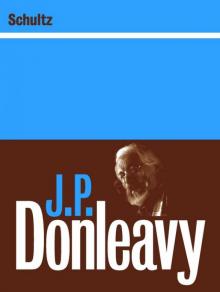 Schultz
Schultz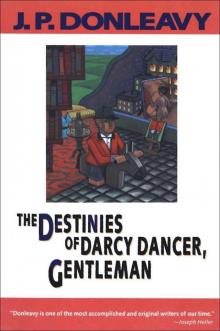 The Destinies of Darcy Dancer, Gentleman
The Destinies of Darcy Dancer, Gentleman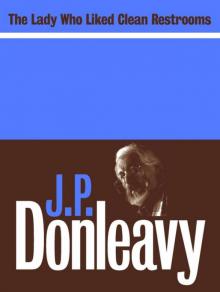 The Lady Who Liked Clean Restrooms
The Lady Who Liked Clean Restrooms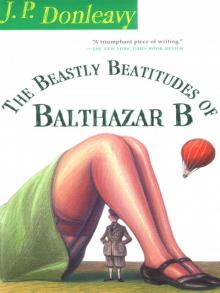 The Beastly Beatitudes of Balthazar B
The Beastly Beatitudes of Balthazar B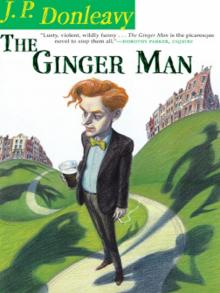 The Ginger Man
The Ginger Man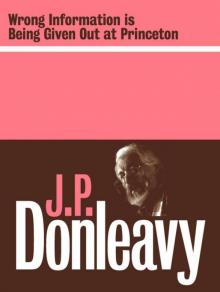 Wrong Information Is Being Given Out at Princeton
Wrong Information Is Being Given Out at Princeton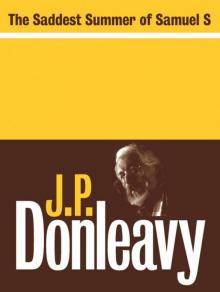 The Saddest Summer of Samuel S
The Saddest Summer of Samuel S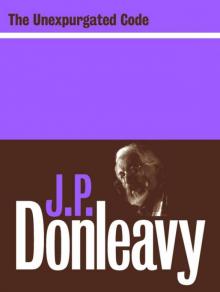 The Unexpurgated Code
The Unexpurgated Code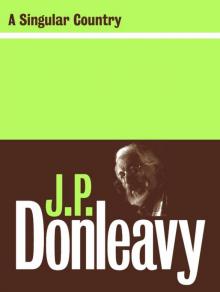 A Singular Country
A Singular Country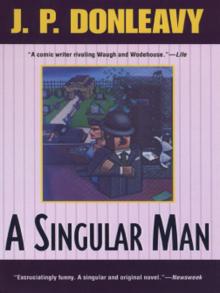 A Singular Man
A Singular Man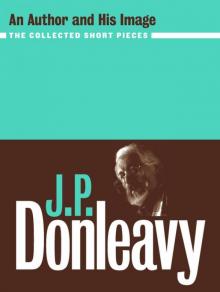 J.P. Donleavy: An Author and His Image
J.P. Donleavy: An Author and His Image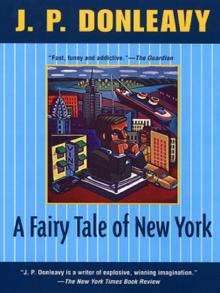 A Fairy Tale of New York
A Fairy Tale of New York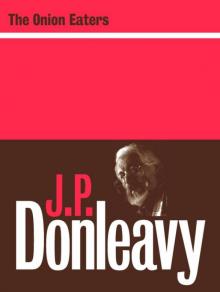 The Onion Eaters
The Onion Eaters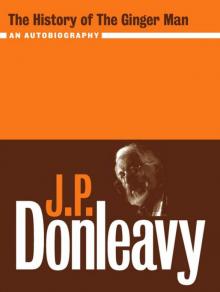 The History of the Ginger Man: An Autobiography
The History of the Ginger Man: An Autobiography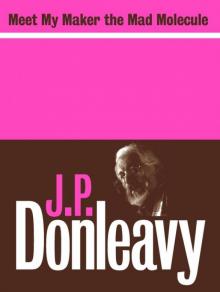 Meet My Maker the Mad Molecule
Meet My Maker the Mad Molecule Leila
Leila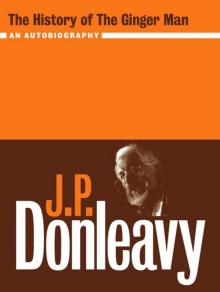 The History of the Ginger Man
The History of the Ginger Man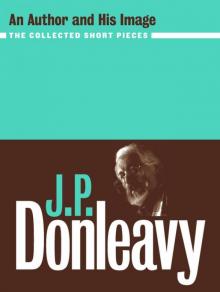 J.P. Donleavy
J.P. Donleavy